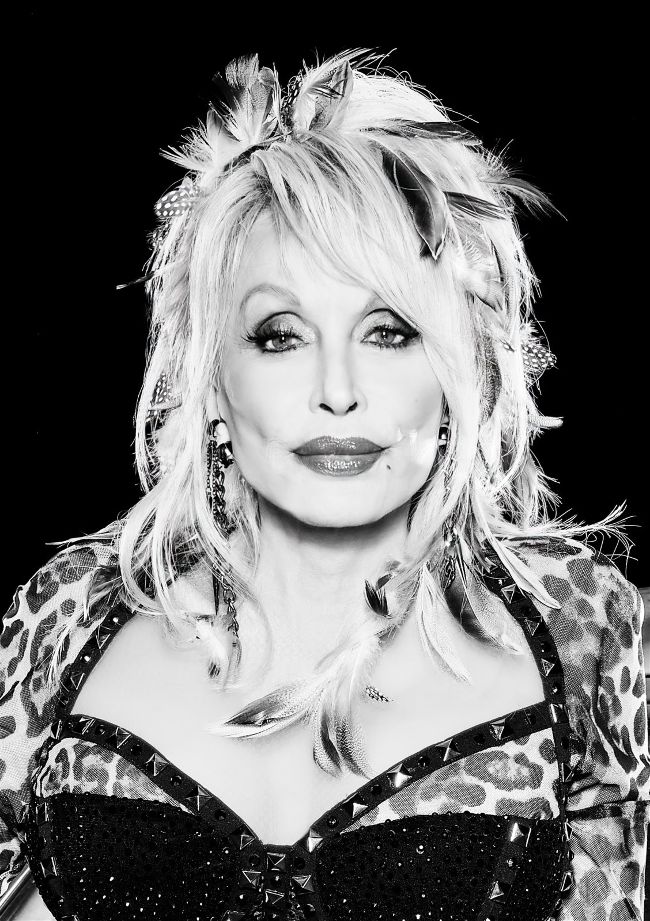THE MOJO INTERVIEW
Born poor on the side of a mountain, she’s the country mogul who’s only now, at 77, learning to rock. Another of those surprises she keeps on springing? “I just go where my heart leads,” says Dolly Parton.
Interview by GRAYSON HAVER CURRIN
• Portrait by VIJAT MOHINDRA

Courtesy of Butterfly Records, Angela Ricciardi
DOLLY PARTON DOES NOT MUCH CARE for casual handshakes or perfunctor y hugs.
In late June, on a steamy Nashville night in an industrial enclave of the Tennessee capital, a phalanx of armed security guards and coiffed personal assistants direct traffic in a concrete hallway belonging to Parton’s manager. Parton’s latest album, Rockstar, the collab-crammed, 30-song release inspired by her 2021 induction into the Rock and Roll Hall of Fame, is still five months from release. But she has invited family members and the musicians who played on it to a private listening party, ser vers circling the room with platters of chips, salsa, and churros.
Sartorially, Parton is channelling ‘rock’ in a white body suit, split down the legs and bound together with stitching that suggests chain mail. She stands in front of a banner twice her size, bearing her name and Rockstar’s heavy metal-lite logo, posing for photos with every attendee. Her helpers str uggle to maintain a single-file line, to keep it moving, people.
Parton, 77, isn’t exactly helping. She gabs with guests like a childhood friend, clasping the hands of strangers in both of hers and howling when she recognises someone. When a newlywed pair flank her, she says, “Now I know why you got married,” pointing to a burgeoning baby bump. Ever yone in the corridor erupts.
“I can fit in with anybody, anywhere, in any situation, whether it be the White House or the outhouse,” Parton tells MOJO, guffawing. “I’m comfortable with that, because I’m comfortable with me.”
WE’RE NOT WORTHY
Angel Olsen on country’s divine Wiggy Stardust.
“Dolly has been so many people. She’s created this doll character she uses in the same way David Bowie did, to turn heads so people listen to what she’s saying. She’s really smart. And the wigs! I don’t know if she did say ‘The higher the hair the closer to God’ but she could have. She’s such a force.”
Such is the wisdom of Parton. She is, after all, one of the great songwriters of her generation, a fact sometimes overshadowed by her outsized personality. Born on a mountain at Tennessee’s eastern edge, her 1964 move to Nashville was to open one of countr y music’s deepest veins, though it took a daring decision, in 1974, to quit countr y standard bearer Porter Wagoner’s iconic television show for her talent to fully flower. Parton penned Jolene and I Will Always Love You within days of one another, capturing them on the same demo album. Coat Of Many Colors, My Tennessee Mountain Home, 9 To 5, Light Of A Clear Blue Morning: entire chapters of the countr y songbook belong to Parton.
Despite more than a half-centur y of stardom, she remains committed to both home and work. For nearly 60 years, she has been married to Carl Dean, a steadfastly private man she met as a str uggling songwriter washing dirty clothes in Nashville. She owns a theme park, Dollywood, around the mountain from her birthplace. She runs a sprawling childhood literacy programme and made a $1 million donation to Covid vaccine research in Tennessee.
And still, Parton cannot fathom being done. On the same night people are finally hearing her rock opus, she talks about her plans to make a gospel counterpart while launching her own television network, a line of wigs, and a TV series that captures her uncanny life stor y in candid detail.
“Ever y day, I wake up with new stuff on my mind, new dreams to dream. And ever y dream brings on some other new dream, because you see all these opportunities from the last thing you did,” she says. “I never know exactly what I’m going to do. I just go where my heart leads.”